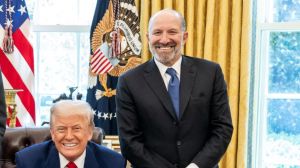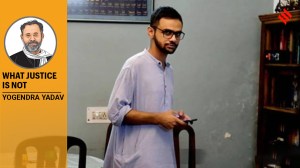Stay updated with the latest - Click here to follow us on Instagram
Gambling by Richard Sidaway
Human beings have spent large amounts of money trying to beat the laws of probability for centuries...
The Indian Express in association with The British Council presents another initiative Learn English.
There will be a series of 36 articles appearing in the Quest page every thursday. This is the 13th episode in the series of 36.There are also exciting prizes to be won. You can collect upto 26 articles and send it back to us in a scrapbook format.
The best four entries will win:
* 2 Free Adult courses (For classesVIII to XII) of 32 hours duration.
* 2 Free Young Learners Courses (For classes IV to VII) of 16 hours duration.
The courses are offered only at The British Council English Language Teaching Centre,Delhi .
For more details of the courses please visit http://www.britishcouncil.org/india
Human beings have spent large amounts of money trying to beat the laws of probability for centuries. More than 30 countries have currently legalised gambling in the form of national lotteries or private casinos. In the last ten years,this addictive pastime has been generating millions more via the Internet.
So how do you become a successful gambler? Back in 1873,engineer Joseph Jagger won $300,000 dollars in three days at a casino in Monte Carlo by noticing that the mechanical faults in their roulette wheels made certain numbers come up more often than others. More recently,an Australian wrote a software programme to help him spot winners on the horses in Hong Kong and has supposedly won $150 million over the last 20 years.
Whats the biggest lottery jackpot ever? The record is currently $390 million,won by two people in the USA in May 2002. This,of course,is peanuts. It costs $444 million a year just to keep an aircraft carrier in the water. The biggest single win on a national lottery was $314.9 million in the Powerball game in 2002 by a man who had already made a fortune in the sewer business. Another American won $39.7 million from a slot machine in a Las Vegas casino in 2003 after putting in about $100 worth of coins. The lucky man had actually only gone to watch a basketball match.
Why do lotteries exist? Often to make money for the state. The Chinese had a lottery over 2,000 years ago to raise money to build the Great Wall. King James I of England set one up to finance the new colony of Virginia in America in the 17th Century. The British Museum in London was also built this way.
Which city earns the most from gambling? Las Vegas,of course. Before gaming was legalised there in the 1930s it was a small desert town; today it has 35 million visitors and earns seven and a half thousand million dollars from its casinos every year. What do they do with the profits? Build hotels,it seems the worlds biggest is the MGM Grand Hotel and Casino,with 5,005 rooms. In fact,somebody estimated it would take one person 329 years to sleep in every hotel room in Vegas.
Whats the least successful bet? Politician and fraudster Horatio Bottomley went to Belgium in 1914 and bought all six horses in a race. He also paid the jockeys to cross the finishing line in a particular order. Then he put huge amounts of money on all the horses. Unfortunately,the race meeting was by the sea and a mist came in and covered the entire course. The jockeys couldnt see each other and the judges couldn’t make out who had won. Bottomley lost a fortune.
Whats the longest-running bet? There was a ten-year bet between writer Paul Ehrlich and businessman Julian Simon that the price of certain metals would be higher in 1990 than in 1980. Ehrlich lost when copper,chrome,nickel,tin and tungsten dropped in price. Simon was trying to make the point that the world is not heading for a catastrophe and that we are not using up the worlds resources as Ehrlich had predicted. He refused,however,to agree to a second bet that in the following ten years there would be an increase in greenhouse gases and AIDS victims and a decrease in tropical rainforests,agricultural land and the human sperm count.
Whats the strangest bet ever made? Heres one that started a hundred years ago in a London club,presumably after a certain amount of alcohol had been taken. An American businessman bet a British investor $100,000 that it was not possible to walk around the world without being recognised. A certain Harry Bensley agreed to take up the challenge. He had to wear an iron mask for the whole trip and pay his way by selling pictures of himself. While travelling,he also had to find a woman who would marry him,to push a pram and carry only one change of underwear! He set off from London in January 1908 and was arrested a few miles down the road for selling postcards without a licence. He supposedly got most of the way round the world and was in Italy on his way home in 1914 when the First World War broke out and he had to call the whole thing off.
Vocabulary
Five words/phrases from the text:
* make out: see or distinguish
* broke out: start suddenly
* take up: accept
* set off: start on a journey
* call off: cancel
Exercise one
Vocabulary gap fill. Now use the five words/phrases to fill the gaps in the sentences below:
Nobody was very surprised when war [1 in 1939.
I usually [2 very early in the morning to avoid the traffic.
It was not an easy decision to make but she decided to [3 the challenge.
We had to [4 the match because of the bad weather.
In the dark it was very difficult to [5 which was the right house.
Exercise two
Comprehension: explain the significance of the following numbers:
1. 1 3
2. 100
3. 7.5 thousand million
4. Six
5. 1908
Joke teacher
‘Wit ought to be a glorious treat,like caviar. Never spread it about like marmalade.’
Noel Coward
‘An original idea. That can’t be too hard. The library must be full of them.’
Stephen Fry
Clever and original ideas that amuse us are known as wit. It is a type of humour for which individuals often become famous. Who is famously witty in your country?
‘He has all the virtues I dislike and none of the vices I
admire.’
Winston Churchill
Answers
Vocabulary
1. broke out
2. set off
3. take up
4. call off
5. make out
Comprehension
1. The number of days it took Joseph Jaggers to win $300,000 at Monte Carlo
2. The amount of dollars someone spent in 2003 to win $39.7 million in Las Vegas
3. The amount of dollars Las Vegas earns from gambling every year
4. The number of horses Horatio Bottomley bought to try and fix a horse race
5. The year Harry Bensley started walking around the world to win a bet







